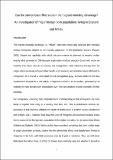Files in this item
Can the salmon bias effect explain the migrant mortality advantage in England and Wales?
Item metadata
| dc.contributor.author | Wallace, Matthew | |
| dc.contributor.author | Kulu, Hill | |
| dc.date.accessioned | 2020-03-22T00:32:39Z | |
| dc.date.available | 2020-03-22T00:32:39Z | |
| dc.date.issued | 2018-03-22 | |
| dc.identifier | 252614621 | |
| dc.identifier | 15e99e58-6ed4-46a8-a197-20e5162cd879 | |
| dc.identifier | 85044212695 | |
| dc.identifier | 000450332000011 | |
| dc.identifier.citation | Wallace , M & Kulu , H 2018 , ' Can the salmon bias effect explain the migrant mortality advantage in England and Wales? ' , Population, Space and Place , vol. Early View , e2146 . https://doi.org/10.1002/psp.2146 | en |
| dc.identifier.issn | 1544-8444 | |
| dc.identifier.other | ORCID: /0000-0001-8808-0719/work/75997002 | |
| dc.identifier.uri | https://hdl.handle.net/10023/19691 | |
| dc.description | This research was possible through funding by the Economic and Social Research Council (ES/J500094/1; “Mortality among Immigrants and their Descendants in England and Wales”) and North West Doctoral Training Centre. | en |
| dc.description.abstract | Despite researchers regularly observing a migrant mortality advantage in high‐income destination countries, it remains unclear whether empirically observed low mortality among foreign‐born relative to natives is genuine or a result of censoring and selection biases inherent in the remigration of foreign‐born individuals. Our aim is to determine whether the main mode of selection bias, the “salmon bias effect” (remigration triggered by poor health), can account for this low foreign‐born mortality. We use the largest longitudinal resource in the United Kingdom, the Office for National Statistics Longitudinal Study, to fit discrete‐time survival models and observe which foreign‐born populations experience a migrant mortality advantage and/or salmon bias effect. For foreign‐born groups in which we observe both, we correct their mortality (using an indirect method) to see if the salmon bias can explain the observed mortality advantage. Importantly, we demonstrate that for many foreign‐born groups a mortality advantage exists in the absence of the salmon bias effect. Furthermore, in cases which we observe a mortality advantage and salmon bias (males and females from India, Pakistan and Bangladesh, and the Caribbean), the latter cannot sufficiently “explain away” the former. Taken together with previous findings on censoring bias in the United Kingdom and the wider international literature on censoring and selection biases, it becomes clear that remigration biases alone cannot sufficiently explain the migrant mortality advantage. | |
| dc.format.extent | 18 | |
| dc.format.extent | 1974989 | |
| dc.language.iso | eng | |
| dc.relation.ispartof | Population, Space and Place | en |
| dc.subject | Healthy migrant effect | en |
| dc.subject | Longitudinal study | en |
| dc.subject | Migrant mortality advantage | en |
| dc.subject | Remigration | en |
| dc.subject | Salmon bias effect | en |
| dc.subject | Survival analysis | en |
| dc.subject | G Geography (General) | en |
| dc.subject | 3rd-DAS | en |
| dc.subject.lcc | G1 | en |
| dc.title | Can the salmon bias effect explain the migrant mortality advantage in England and Wales? | en |
| dc.type | Journal article | en |
| dc.contributor.institution | University of St Andrews. School of Geography & Sustainable Development | en |
| dc.identifier.doi | 10.1002/psp.2146 | |
| dc.description.status | Peer reviewed | en |
| dc.date.embargoedUntil | 2020-03-22 |
This item appears in the following Collection(s)
Items in the St Andrews Research Repository are protected by copyright, with all rights reserved, unless otherwise indicated.

